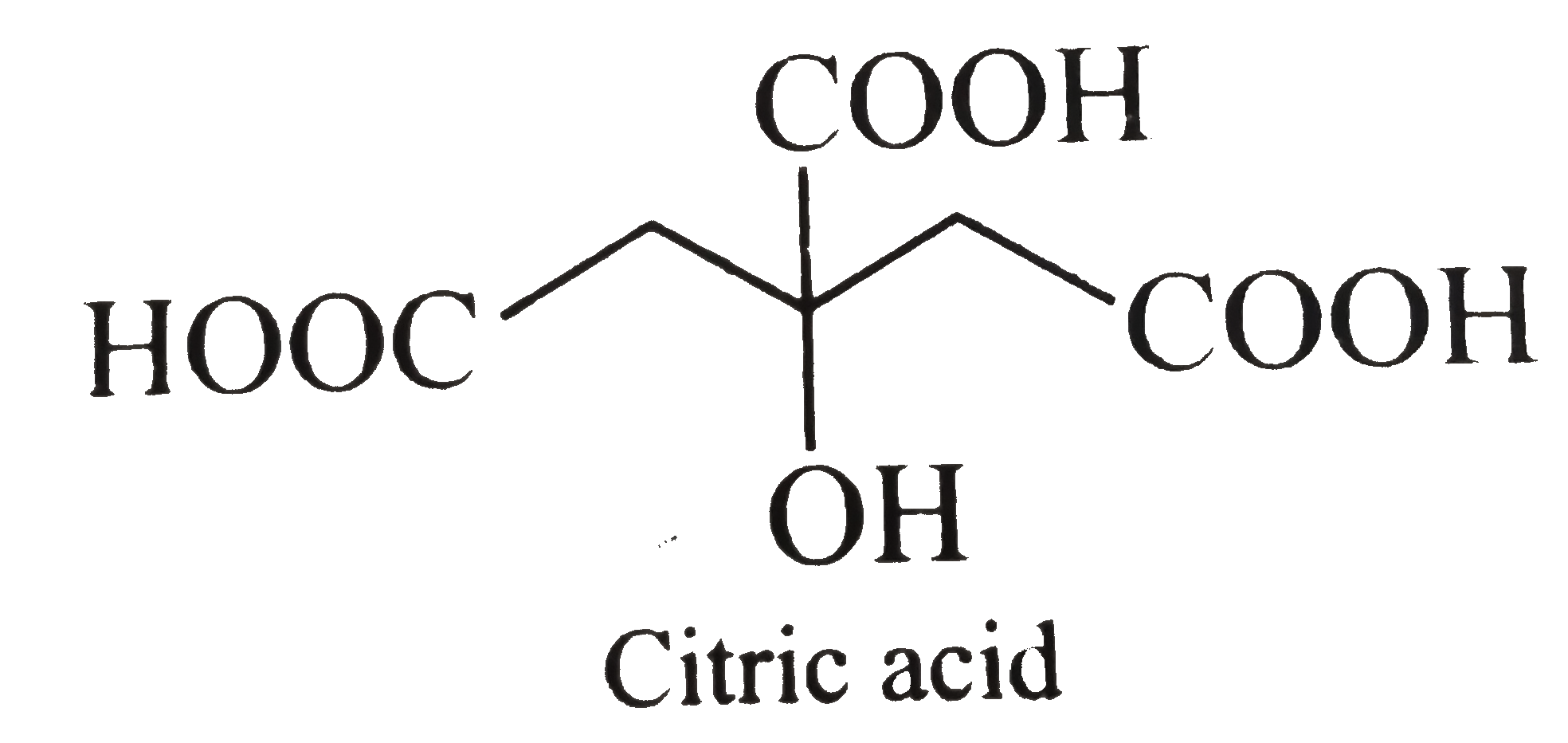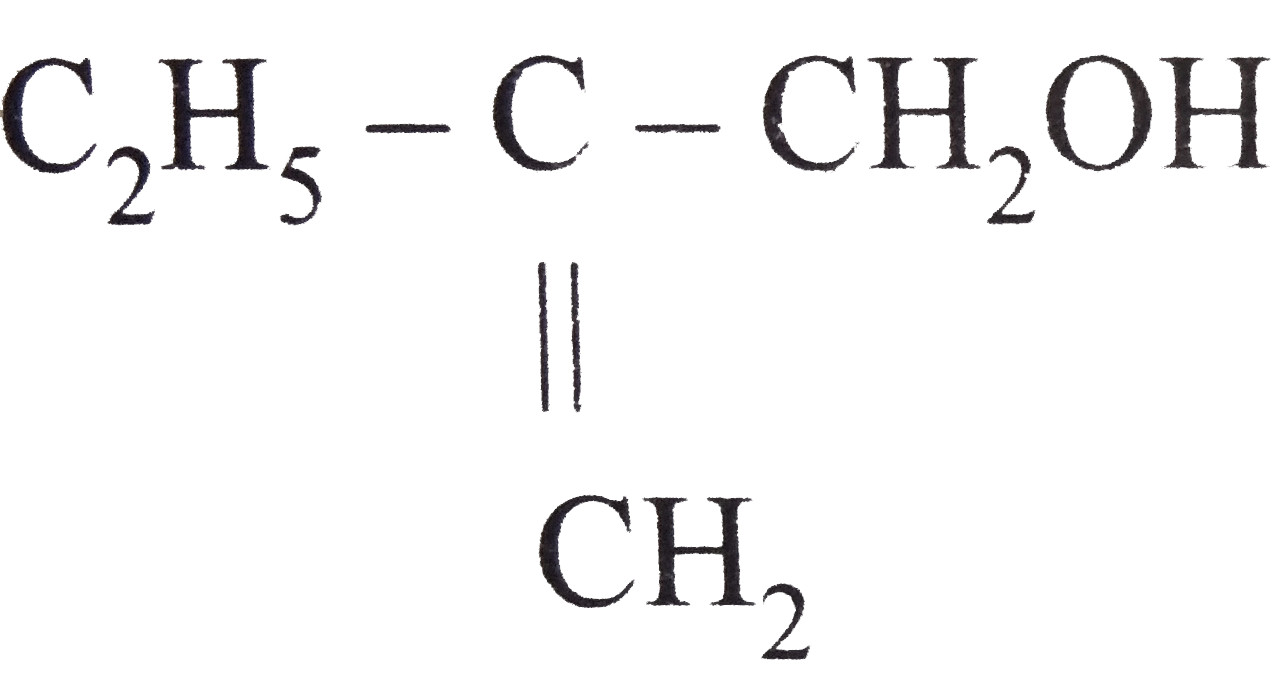Assertion (A) : The IUPAC name of the citric acid is 2-hydroxy-propane-1,2,3-tricarboxylic acid
Reason (R): When an unbranched C atom directly linked to more than two like-functional groups, then it is named as a derivative of the parent alkane which does not include the C of the functional groups.

If both (A) and (R) are correct and (R) is the correct explanation for (A).
If both (A) and (R) are correct and (R) is not the correct explanation.
If (A) is correct and (R) is incorrect.
If both (A) and (R) are incorrect.
The correct Answer is:A
Step by step video, text & image solution for Assertion (A) : The IUPAC name of the citric acid is 2-hydroxy-propane-1,2,3-tricarboxylic acid Reason (R ): When an unbranched C atom directly linked to more than two like-functional groups, then it is named as a derivative of the parent alkane which does not include the C of the functional groups. by Chemistry experts to help you in doubts & scoring excellent marks in Class 11 exams.
Updated on:21/07/2023Topper's Solved these Questions
- CLASSIFICATION AND NOMENCLATURE OF ORGANIC COMPOUNDSBOOK - CENGAGE CHEMISTRYCHAPTER - CLASSIFICATION AND NOMENCLATURE OF ORGANIC COMPOUNDSEXERCISE - Fill in the Blanks Type
5 Videos
- CLASSIFICATION AND NOMENCLATURE OF ORGANIC COMPOUNDSBOOK - CENGAGE CHEMISTRYCHAPTER - CLASSIFICATION AND NOMENCLATURE OF ORGANIC COMPOUNDSEXERCISE - Analytical and Descriptive Type
3 Videos
- CLASSIFICATION AND NOMENCLATURE OF ORGANIC COMPOUNDSBOOK - CENGAGE CHEMISTRYCHAPTER - CLASSIFICATION AND NOMENCLATURE OF ORGANIC COMPOUNDSEXERCISE - Single correct Answer Type
44 Videos
- CHEMICAL EQUILIBRIUMBOOK - CENGAGE CHEMISTRYCHAPTER - CHEMICAL EQUILIBRIUMEXERCISE - Archives (Subjective)
11 Videos
- GENERAL ORGANIC CHEMISTRYBOOK - CENGAGE CHEMISTRYCHAPTER - GENERAL ORGANIC CHEMISTRYEXERCISE - Analytical and Descriptive
1 Videos
Similar Questions
Point out the false statements from the following and rectify them :
(a) The members in a homologous series can be represented by same general formula.
(b) CnH2n is the general formula for the members of alkane familt.
(c) Prefixes n-, iso-, tert-, neo- etc. are used in the IUPAC names of the compounds.
(d) Neohyfrocarbon contains a tertiary carbon atom.
(e) Propane consists of two primary and one secondary carbon atoms.
(f) Chemical properties of compounds are those of the functional groups.
(g) CHO group gets priority over COOH group in writing the IUPAC names of the compounds.
View SolutionA compound has molecular formula C2H6O.lt can be used as a fuel. Identify the name of the compound and functional group present in it. Write the reaction involved in the conversion of this compound into Ethanoic Acid.
View Solution
Knowledge Check
(A) The IUPAC name of citric acid 2-hydroxypropane-1,2,3-tricarboxylic acid.
(R) When an unbranched carbon atom is directly linked to more than two like functional groups. Then it is named as a derivative of the parent alkane which does not include the carbon atoms of the functional groups.AIf both assertion and reason are correct and reason is the correct explanation of the assertionBIf both assertion and reason are correct but reason is not correct explanation of the assertion.CIf assertion is correct but reason is incorrect.DIf assertion is incorrect but reason is correctAssertion : The IUPAC name for the compound C6H5COOCH2CH2COOH is 3−benzoyloxypropanoic acid.
Reason :C6H5CH2O is called benzoyloxy group.AIf both the assertion and reason are true and reason is the correct explanation of the assertion .BIf both the assertion and reason are true bu the reason is not the correct explanation of assertion.CIf the assertion is true but reason is false.DIf assertion is false but reason is true.Assertion (A) : Common name of CH3−CHCl2 is ethylidene chloride.
Reason (R) As we go down the group in the Periodic Table, the size of halogen atom decreases.ABoth Assertion (A) and Resort (R) are correct statements, quid Reason (R) is the correct explanation of the Assertion (A).BBoth Assertion (A) and Reason (R) are correct statements, brit Reason (R) is not the correct explanation of the Assertion (A).CAssertion (A) is correct, but Reason (R) is incorrect statement.DAssertion (A) is incorrect, but Renson (R) is correct statement.
The IUPAC names of open chain aliphatic aldehdes and ketones are derived from the names of the corresponding alkanes by replacing the ending -e with -al and - one respectively. In case of aldehydes the longest carbon chain is numbered starting from the carbon of the aldehyde group while in case of ketones the numbering begins from the the end nearer to the carbonyl group. The substituents are prefixed in alphabetical order along with numberals indicating their positions one . when the aldehyde group is attached to a ring, the suffix carbaldehyde is added after the full name of the cycloalkane. The numbering of the ring carbon atoms start from the carbon atom attached to the aldehyde group. The name of the simplest aromatic aldehyde carrying the aldehyde group on a benzene ring is benzenenecarbaldehyde. However, the common name benzaldehyde is also accepted by IUPAC. Other aromatic aldehydes are hence named as substituted benzaldehydes.
Name the following compound as per IUPAC system ?
CH3−Cl∣C=CHCH−CHO
View SolutionRead the given passage and answer questions number 1 to 5 that follow :
In common system, an aliphatic amine is named by prefixing alkyl group to amine, i.e., alkylamine as one word (e.g., methylamine). In secondary and tertiary amines, when two or more groups are the same, the prefix di or tri is appended before the name of alkyl group. In IUPAC system, primary amines are names as alkanamines. The name is derived by replacement of 'e' of alkane by the word amine. For example, CH3NH2 is named as alkanamines. The name is derived by replacement of 'e' of alkane by the word amine. For example, CH3NH2 is named as methanamine. In case, more than one amino group is present at different positions in the parent chain, their positions are specified by giving numbers to the carbon atoms bearing −NH2 groups and suitable prefix such as di, tri, etc., is attached to the amine. The letter 'e' of the suffix of the hydrocarbon part is retained. For example, H2N−CH2−CH2−NH2 is named as ethane-1, 2-diamine.
To name secondary and tertiary amines, we use locant N to designate substituent attached to a nitrogen atom. For example, CH3NHCH2CH3 is named as N-methylethanamine and (CH3CH2)3N is named as N, N-diethylethanamine. In arylamines, −NH2 group is directly attached to the benzene ring. C6H5NH2 is the simplest example of arylamine. In common system, it is known as aniline. It is also an accepted IUPAC name. While naming arylamines according to IUPAC system, suffix 'e' of arene is replaced by 'amine'. Thus in IUPAC system, C6H5−NH2 is named as benzenamine.
Name the compound according to IUPAC system :
CH3−CH∣NH2−CH2−CH2−NH2
View SolutionAssertion (A) : The function
f:(1,2,3)→(a,b,c,d) defined by
f={(1,a),(2,b),(3,c)} has no inverse.
Reason (R) f is not one-one.
View SolutionAssertion : When the alkyl group is small like −CH3 group, there is n steric hindrance to H-bonding.
Reason (R) : In aniline or other arylamines, the −NH2 group is attached directly to the benzene ring.
View SolutionAssertion : The IUPAC name for the compound

Reason : Ethyl(C2H5−) rather than methylen (=CH2) is considered as the substituent group because 'e' of ethyl comed first in alphabetical order than 'm' of methylene.
View Solution
